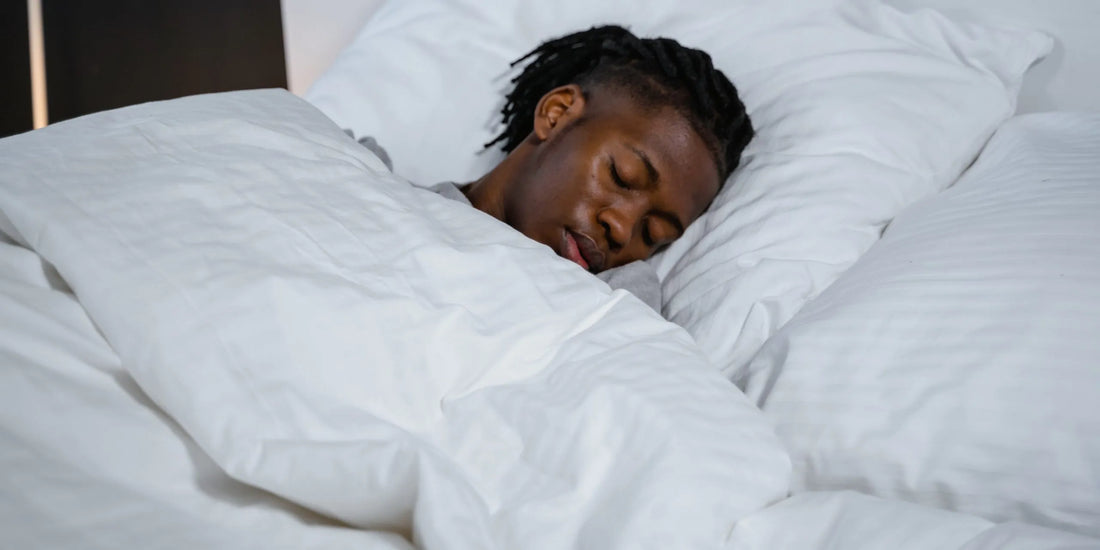Testosteron, das männliche Hormon schlechthin, prägt sowohl die körperlichen als auch die geistigen Aspekte der Männlichkeit. In diesem Blogbeitrag wollen wir die Geheimnisse lüften, wie sich Schlaf auf dieses lebenswichtige Hormon auswirkt.
Testosteron: Das Hormon, das Ihren Körper und Geist beeinflusst
Testosteron ist ein Steroidhormon. Es spielt eine entscheidende Rolle bei der Regulierung der Sexualfunktion, der Fruchtbarkeit und dem Einsetzen körperlicher und Verhaltensänderungen während der Pubertät. Es ist die treibende Kraft hinter dem Wachstum der Gesichtsbehaarung, der Vertiefung der Stimme und dem Aufbau von Muskelmasse und verkörpert wahre Männlichkeit.
-
Stress
-
Diät
-
Übung
-
Schlafen
Werfen wir nun einen Blick auf die Unterschiede zwischen niedrigem und hohem Testosteronspiegel, was sie verursacht und warum keiner von beiden eine gute Sache ist.
Der Zusammenhang zwischen Testosteron und Schlaf: Was Sie wissen müssen
Es besteht ein enger Zusammenhang zwischen Testosteron und Schlaf. Wissenschaftliche Studien haben gezeigt, dass Männer mit niedrigem Testosteronspiegel häufiger unter Schlafmangel leiden. Die Synergie zwischen diesen beiden Einheiten geht jedoch über die bloße Korrelation hinaus, sie wurzelt in einem Netz von Mechanismen, die die Vitalität eines Mannes tiefgreifend beeinflussen.
Schlaf spielt eine wichtige Rolle bei der Produktion von Testosteron und reguliert das luteinisierende Hormon, das wiederum die Testosteronproduktion stimuliert. Darüber hinaus wirkt Schlaf als wirksames Mittel zur Stressreduzierung, optimiert den Hormonspiegel und dient als kritische Phase für die Erholung und Reparatur des Körpers.
Niedriger Testosteronspiegel: Die Herausforderungen meistern
Ein niedriger Testosteronspiegel kann einen Schatten auf das Leben eines Mannes werfen und eine Reihe unerwünschter Symptome hervorrufen*:
-
Ermüdung
-
Verminderte Libido
-
Muskelmasseverlust
-
Restless-Legs-Syndrom
-
Nachtschweiß
-
Schlaflosigkeit
Im Zusammenhang mit dem Schlaf kann ein niedriger Testosteronspiegel die Produktion von Melatonin stören und den Spiegel von Stresshormonen erhöhen. Es kann zu Veränderungen der Körperzusammensetzung, wie z. B. einem Anstieg des Körperfetts, führen, was auch Ihre Ruhe beeinträchtigen kann.
Hoher Testosteronspiegel: Die Gleichung ausgleichen
Klinisch erhöhte Testosteronspiegel oder Hyperandrogenismus können sich auf verschiedene Weise äußern.
Während ein hoher Testosteronspiegel nicht unbedingt schädlich und für verschiedene Körperfunktionen sowohl bei Männern als auch bei Frauen unerlässlich ist, kann ein zu hoher Testosteronspiegel zu bestimmten gesundheitlichen Symptomen und Risiken führen, wie zum Beispiel:*
-
Übermäßiger Haarwuchs am Körper, insbesondere im Gesicht, auf der Brust und am Rücken
-
Haarausfall auf der Kopfhaut
-
Reizbarkeit & Aggression
-
Depression und Angst
-
Schlafapnoe
-
Erhöhtes Risiko für Herzerkrankungen und Schlaganfälle
So optimieren Sie den Testosteronspiegel auf natürliche Weise mit einer guten Nachtruhe
Der Zusammenhang zwischen Testosteron und Schlaf ist komplex und nicht vollständig geklärt. Untersuchungen legen jedoch nahe, dass ein hoher Testosteronspiegel negative Auswirkungen auf die Schlafqualität und -dauer haben kann. Glücklicherweise gibt es eine Reihe einfacher Änderungen in Ihrem Lebensstil, mit denen Sie Ihren Testosteronspiegel verbessern können.
- Regelmäßig Sport treiben
Krafttraining und Aerobic-Übungen sind die besten Möglichkeiten, den Testosteronspiegel auf natürliche Weise zu steigern.
- Iss gesund
Wählen Sie Lebensmittel, die reich an Proteinen und gesunden Fetten sind, um die Testosteronproduktion anzukurbeln.
- Stress bewältigen
Stressbewältigungstechniken wie Meditation, Yoga und Zeit in der Natur können dazu beitragen, Ihr allgemeines Wohlbefinden zu verbessern.
- Rauchen und Alkohol minimieren
Vermeiden Sie übermäßigen Alkoholkonsum und Rauchen, da diese schlechten Gewohnheiten den Testosteronspiegel senken können.
- Investiere in deinen Schlaf
Schlaf ist ein Eckpfeiler des hormonellen Gleichgewichts, und unzureichender oder schlechter Schlaf kann den hormonellen Rhythmus Ihres Körpers stören. Mit anderen Worten: Der Weg zur Optimierung des Testosteronspiegels beginnt auf natürliche Weise mit einem guten Schlaf.
The ErgoSportive™ Bett ist ein treuer Verbündeter auf Ihrem Weg zur Stressbewältigung und einer besseren Schlafqualität. Seine fortschrittliche Schlaftechnologie liefert Ihnen unschätzbare Einblicke in Ihre Schlafmuster und hilft Ihnen, den erholsamen Schlaf zu erreichen, den Ihr Körper wirklich braucht.
Indem Sie diese grundlegenden Strategien in Ihr tägliches Leben integrieren und Ihren Lebensstil damit verbessern Ergomotion® Plus Technologiegy können Sie proaktive Maßnahmen ergreifen, um Ihren Testosteronspiegel auf natürliche Weise zu optimieren und das allgemeine Wohlbefinden zu unterstützen.
Wenn weiterhin Bedenken hinsichtlich Ihres Testosteronspiegels bestehen, empfehlen wir dringend, für eine umfassende Untersuchung den Rat eines Arztes einzuholen.
*Es ist wichtig zu wissen, dass nicht bei allen Männern die gleichen Symptome auftreten und dass die Schwere dieser Symptome von Person zu Person erheblich variieren kann.




